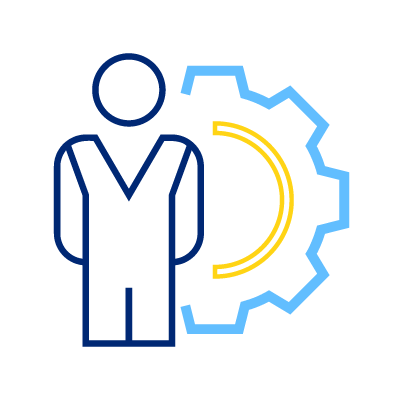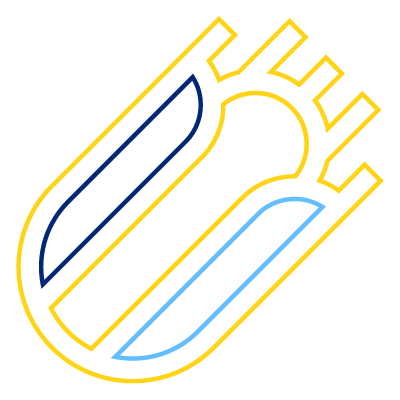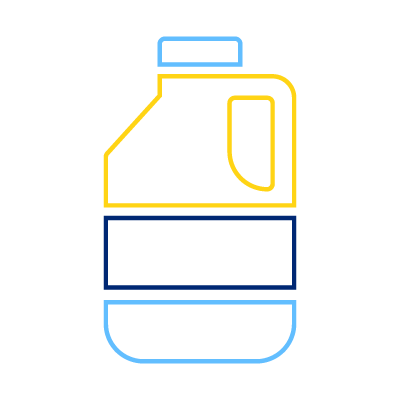eDairy Training and Extension Modules
SNV Uganda’s The Inclusive Dairy Enterprise project (TIDE) aims to provide dairy farmers and other dairy professionals, with knowledge and skills for enhanced dairy farm management and profitability. To ensure that dairy knowledge is relevant and accessible, TIDE - in collaboration with partners - has developed eDairy modules to support and build the capacity of farmers, extension officers, trainers, input suppliers and service providers.
Intervention Areas
1. Dairy Farm Productivity
Related Links

Practical Skills and Farm Management
2. Milk Quality
KMDP has built up rich knowledge and experience as regards good practice forage production and preservation for smallholder, medium and large scale dairy farms (from seed to feed). In addition to that, it has successfully piloted commercialization of quality forages and of forage contracting services. This was achieved through the SPEN model and the concept of “maize train” (i.e. mechanized agricultural contracting services for maize production, harvesting and silage making), and by facilitating introduction of innovative machinery for making baled silages. Through replication and upscaling, this will ensure enhanced access of quality forages for small medium and large-scale dairy farms.
In 2018 KMDP-II also started a pilot on introduction of feed rationing software to help optimizing total rations and margin over feeds. KMDP participates in sector platforms that discuss forage availability in Kenya and supported the National Fodder Conference in Nakuru in December 2017 and the Animal Production Society in Nanyuki in March 2018Related Links

Feed and Fodder
3. Value Chain
KMDP-II works with 17 dairy cooperative societies and 3 milk processors (Meru Dairy Cooperative Union, Happy Cow Ltd and Bio Foods Ltd) on a number of issues related to milk production, collection, bulking and marketing; service provision and governance & management. The interventions on milk quality range from more generic to specific in terms of piloting innovations and policy lobbying. On the generic level milk collectors, transporters and graders of dairy cooperatives are trained and policies are being developed and implemented at cooperative level at all 17 cooperatives. Next to this KMDP has a targeted approach where it supports Happy Cow Ltd from Nakuru and two of the cooperatives that supply the processor with milk, with implementing a milk quality tracking & tracing system and a quality based milk payment system. At policy level KMDP-II works with the Kenya Dairy Board (KDB) and the Kenya Dairy Processors Association (KDPA), where it supports the safe milk campaign and strategic planning
Related Links
Implementation of a quality-based milk payment (QBMP) system in Kenya 3R Kenya Project Research Brief)

Milk Quality
4. Nutrition
KMDP-II (as in KMDP-I) promotes and supports within the partnerships it has with processors (3) and dairy societies (17), so-called functional dairy value chains. These are characterized by formal and inclusive relationships between farmers, dairy societies and processors with inclusion of youth and women. Important drivers for such relationships are trust and loyalty, timely payment, fair and stable prices and provision of quality services from the processor to the dairy society to the farmer. This includes services provided in-house and partnerships with private input and service providers. These services should be geared towards enhancing productivity at the farm level, and efficiency & quality in raw milk collection and marketing. As this will contribute to enhanced profitability and sustainability of the dairy enterprise and the industry as a whole.
Functional dairy value chains are also characterized by a stable and conducive relationship of dairy value chain actors and input/service providers with policy makers and regulators. Be it at the level of Counties or national government, with a common vision on how to address systemic bottlenecks for sector growth and competitiveness. At this level KMDP supports Kenya Dairy Board and Kenya Dairy Processors Association, the latter with strategic plan development. KMDP also participates in national forums for feed & fodder, milk quality and TVET (practical skills development).Related Links

Functional Dairy Value Chains
5. School Milk
KMDP promotes and facilitates international knowledge exchange, business linkages and other partnerships for learning and exchange. This is seen as an important condition for fast-tracking adoption of good agricultural practices and innovations that are necessary to enhance the competitiveness of the sector, its long term sustainability and its attractiveness for investors. KMDP organises and supports investors’ forums, dairy trade fairs and exhibitions, market studies/scans, international study tours and trainings, and most importantly business-to-business linkages (B2B). B2B linkages and partnerships are considered as a more sustainable way of promoting change, innovations and best practices than aid-relationship are, as they are market-led and will continue as long as there is demand for the products and services. KMDP-I and II have been successful in forging B2B linkages between Kenyan and Dutch input suppliers and service providers, and assisted others with setting up base in Kenya and investing in the sector. This is partly facilitated through KMDP's Funds.
Related Links
Eldoret Dairy Investors Forum KMDP-II Innovation & Investment Fund Charter

School Milk
The Inclusive Dairy Enterprise (TIDE) Phase 2
SNV Netherlands Development Organisation is a not-for-profit international development organization, working in agriculture, renewable energy, and water, sanitation & hygiene. Founded in the Netherlands in 1965, SNV has built a long-term local presence in more than 30 countries in Asia, Africa and Latin America. SNV’s local and international advisors support communities, businesses and organizations with the tools, knowledge, skills and connections to increase incomes, employment, profitability of farms and SMEs, and/or to gain access to basic services. In doing so SNV seeks to support market-based solutions that are financially and environmentally sustainable and inclusive.
Funded by the Embassy of the Kingdom of the Netherlands in Kampala, since October 2015 SNV has implemented the TIDE project in Southwest Uganda that is now in Phase-2 (2020–23). TIDE-1 supported dairy farmers to transition to semi-intensive production through the creation of a commercial input market in knowledge (training, extension), products and technical services, and finance (credit, subsidies and grants). A market was created for input suppliers and service providers by supporting the development and marketing of products to farmers and cooperatives.


